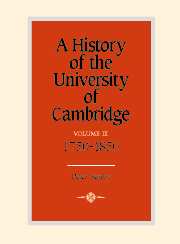Book contents
- Frontmatter
- Contents
- List of illustrations
- General Editor's preface
- Acknowledgements
- List of abbreviations
- Introduction
- 1 Townscape and university: topographical change
- 2 The university: its constitution, personnel, and tasks
- 3 Colleges: buildings, masters, and fellows
- 4 Colleges: tutors, bursars, and money
- 5 Mathematics, law, and medicine
- 6 Science and other studies
- 7 Religion in the university: its rituals and significance
- 8 The Orthodox and Latitudinarian traditions, 1700–1800
- 9 Cambridge religion 1780–1840: Evangelicalism
- 10 Cambridge religion: the mid-Victorian years
- 11 The university as a political institution, 1750–1815
- 12 The background to university reform, 1830–1850
- 13 Cambridge and reform, 1815–1870
- 14 The Graham Commission and its aftermath
- 15 The undergraduate experience, I: Philip Yorke and the Wordsworths
- 16 The undergraduate experience, II: Charles Astor Bristed and William Everett
- 17 The undergraduate experience, III: William Thomson
- 18 Games for gownsmen: walking, athletics, boating, and ball games
- 19 Leisure for town and gown: music, debating, and drama
- Appendices
- Bibliography
- Index
6 - Science and other studies
Published online by Cambridge University Press: 05 April 2012
- Frontmatter
- Contents
- List of illustrations
- General Editor's preface
- Acknowledgements
- List of abbreviations
- Introduction
- 1 Townscape and university: topographical change
- 2 The university: its constitution, personnel, and tasks
- 3 Colleges: buildings, masters, and fellows
- 4 Colleges: tutors, bursars, and money
- 5 Mathematics, law, and medicine
- 6 Science and other studies
- 7 Religion in the university: its rituals and significance
- 8 The Orthodox and Latitudinarian traditions, 1700–1800
- 9 Cambridge religion 1780–1840: Evangelicalism
- 10 Cambridge religion: the mid-Victorian years
- 11 The university as a political institution, 1750–1815
- 12 The background to university reform, 1830–1850
- 13 Cambridge and reform, 1815–1870
- 14 The Graham Commission and its aftermath
- 15 The undergraduate experience, I: Philip Yorke and the Wordsworths
- 16 The undergraduate experience, II: Charles Astor Bristed and William Everett
- 17 The undergraduate experience, III: William Thomson
- 18 Games for gownsmen: walking, athletics, boating, and ball games
- 19 Leisure for town and gown: music, debating, and drama
- Appendices
- Bibliography
- Index
Summary
PRELUDE: THE NEW TRIPOSES, 1850
Geology seems to have been tolerably done by all, brilliantly by none. If the paper had been a quarter of the length, it would have been more satisfactory to all parties. Fuller says Sedgwick boasted of having made it a ‘very complete’ paper, and got all geology into it, to be written out in four hours! We all (i.e. all the first class) did very well in the general paper. I was glad to find that Fuller thinks two subjects as much as anyone can manage.
So wrote one candidate, Fenton J.A. Hort, for the first examination, in Lent 1851, for the Natural Sciences Tripos. Another tripos, in moral sciences, also began at the same time, and Hort was a candidate for that too.
The triposes were set up following considerable pressure from within the university and outside it. For a long time there had been a sense of unease at the contrast between the distinguished scholarship and reputation of the university's professors and their detachment from Cambridge's chief intellectual purpose, the gift of a liberal education based upon mathematics and classics to undergraduates, as measured by the Senate House Examination and the Classical Tripos. These two subjects were taught by colleges almost entirely; professors were little concerned with them. Other subjects were not examined; nor were they taught except by the professors. So Whewell's writings on the nature of a university, which expressed the views of so many at Cambridge, were a defence of the dominant position of mathematics and classics within Cambridge, together with an ingenious plan for assured though subordinate places for the natural sciences and the humanities (the ‘moral sciences’) within the examination hierarchy.
- Type
- Chapter
- Information
- A History of the University of Cambridge , pp. 203 - 259Publisher: Cambridge University PressPrint publication year: 1997

